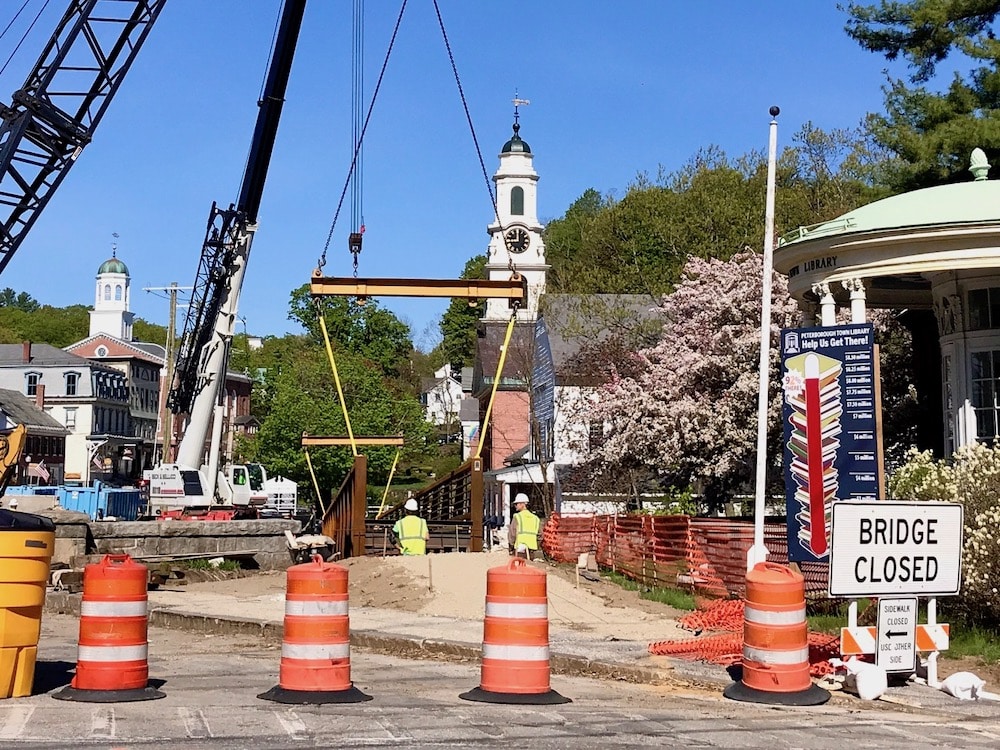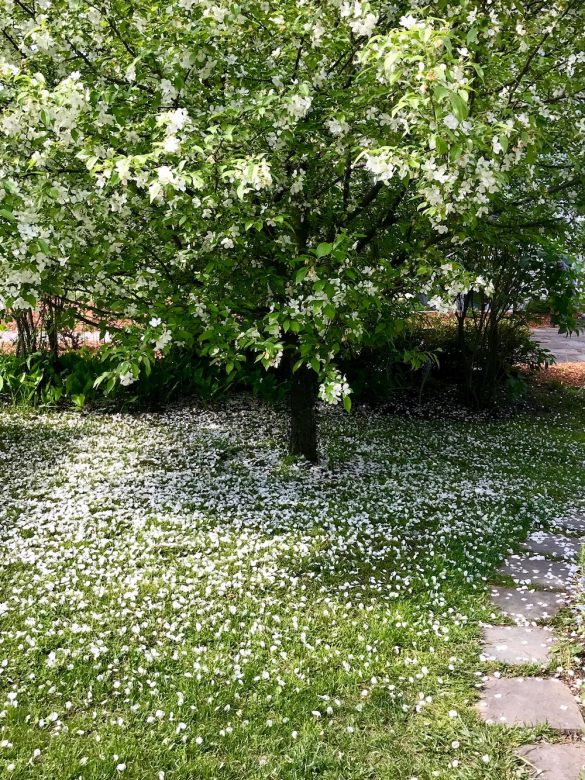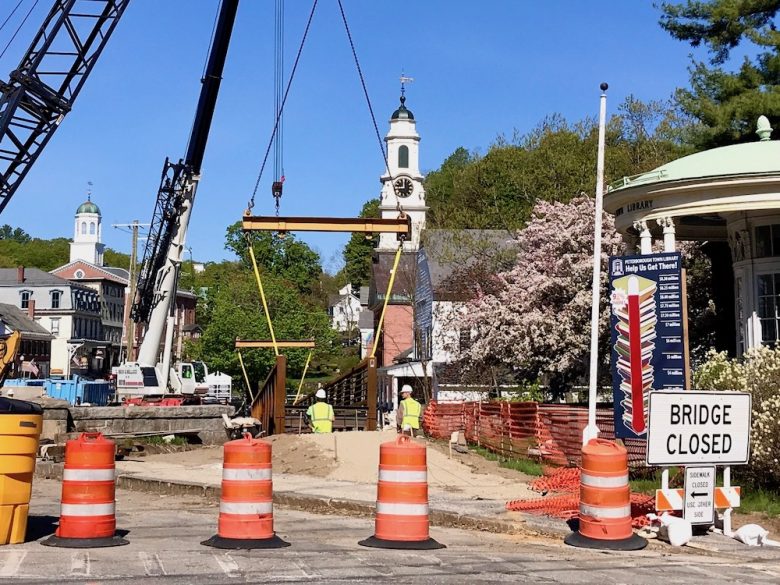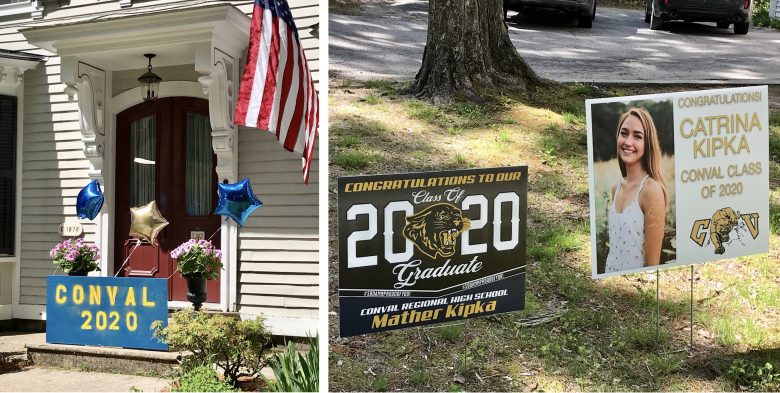Signs of the Times
Editor Mel Allen on how a bridge construction project in a small town leads to thoughts on how we can all help each other get to the other side.

Peterborough bridge project
Photo Credit : Annie GravesIn 2020, an unprecedented American public health crisis profoundly changed the way we live, prompting editor Mel Allen to begin posting regular “Letter From Dublin” dispatches from Yankee’s home in southwestern New Hampshire. This installment first appeared on May 27.
Time is starting to diffuse; I awake with daylight and sleep when it is dark, but the hours in between become harder to discern. Recently I asked Annie what day it was, and she replied, “Noneday.” That seemed about right. I cannot recall another period in my life when nearly everything seems to be so ripe with metaphor. The most ordinary events, things I once took for granted, whether food shopping or waving hello to a passing motorist, seem to carry deeper messages now, or maybe they always did and I am just now paying more attention. Despite myself, as someone who is always hurrying to the next project, I am trying to look a day in the eye and hold its gaze for just a few moments. I am learning patience.
A year or two after we moved in here, we planted a crab apple tree on the front lawn. It was a newborn, tiny and spindly, reaching barely to my knees. Each year it sprouted higher, and now it stretches far above me, well over 15 feet. With the sun and warmth of May the buds opened, and just last week glorious white blossoms filled the tree. These blossoms tease you with their beauty, because soon after that burst of brilliance, petals rained down and laid a carpet of white on the newly mowed grass. When I walk Rudy to the backyard, we have to pass beneath the branches, and the fluttering petals in a breeze must seem to him like flying insects, and he snaps his head trying to corral them. In a few more days the tree will be leafy green, and weeks later tiny apples will emerge, no bigger than almonds. In fall the tree will shelter flocks of trilling cedar waxwings, who feast on the sour fruit. And when the cold comes the tree will be bare, waiting, like all of us, for light and warmth. Nothing I can do will alter that rhythm of beginnings and endings.

Photo Credit : Annie Graves
It takes us five minutes to walk from our house to the center of town. To reach town we cross a 75-foot-long bridge that spans the Contoocook River. Well, we used to cross the bridge. No longer. The bridge was built in 1940 to replace another that was destroyed in the Hurricane of ’38. We have been hearing about the big bridge replacement project for some years, and now the due date has arrived. The quiet beauty of a small New England town has given way to a hub of noise and fierce machines that chew up concrete and dig deep into earth, a scene to hold any 6-year-old kid transfixed for hours. We are told this will be a two-year project, and because it is all new to the eye, we always pause and watch.
Our favorite perch is by the library wall, where you see the river rushing below and the huge bulldozers, bucket loaders, and cranes towering over the scene. On the riverbank rests a lone dinghy that I assume is there on the off chance that a worker will lose his footing and tumble into the cold water and need to be hauled back in. But it seems more likely that after the workers leave for the day, a curious (and foolish) bystander will find it irresistible to explore what the day’s work has uncovered under decades of dirt, and a dunking will be the consequence. Last week when we walked at twilight we saw two women taking selfies while sitting in the bucket loader.

Photo Credit : Annie Graves
We say hello to the workers when we walk by and they nod in return. Their ages seem to span from 20s to 60s. They notice that Rudy walks with a tennis ball wedged in his mouth — a Jack Russell pacifier, I call it — and the other day when he did not have it, one worker yelled out, “Hey, he forgot something.” They will be with us for many months, through heat and cool and then cold, and when they are finished we will have a wider sidewalk, a wider street, and a spanking-new bridge with some of the original stone facing so that we feel we have the same familiar structure, only better.
We watched one recent morning when the temporary pedestrian bridge was being lowered into place, since the sidewalks are now impassable. It has been a lifetime since I was that six-year-old kid, but we both watched the deftness of the crane operator as he had to capture the structure, lift it into the air, and place it ever so gently in place. It took a long time — nearly an hour, it seemed — and it was like watching mechanical surgery, a piece of hard-hat theater many of us never see playing out in our town center.
When we walk past the workers on our way to the park, they politely slide a few steps over, mindful of our concern for distancing even as they stand shoulder to shoulder all day. Two days ago, for the first time, we saw two workers with face masks; I do not know if they were new to the site or new to masks. I have a good friend who for years has worked construction as a blaster. He is now in his mid-60s and feels his age and reads the statistics about who is most vulnerable to this virus, so he wears a mask wherever he works. He says he is the only one. I am as perplexed as anyone over how this simple ask that has been shown to be one weapon we all can employ in this fight has become yet another way we divide.
Some years ago I met the wonderful writer Sarah Wildman at a writers conference in Quebec City. Her daughter, Orli, then was perhaps 4, a beautiful wide-eyed child. She is now 11 and being treated for a rare form of liver cancer. Sarah and her husband brought Orli to Boston for a liver transplant, and then COVID-19 hit us all and here they remain. She wrote an essay about Orli, and this stood out to me. I wish it could be read by every single person who demands the right to not wear a face mask when out in public. It is both a plea and an anthem for looking out for each other, especially those among us who need the most looking after.
We are the people you’re being asked to stay home for. Yes, you’re staying home for yourselves, of course, for your children, your parents. But also for my daughter, whom you’ve never met, who was given a fragile second chance we are so desperate to shelter. And for her doctors and nurses — and for your doctors, and your nurses. The work the world is now doing, my family learned just a few months ago, is akin to building a small lean-to around a newly planted tree, the boards built of good intention and follow-through. They are terrifyingly wobbly.

Photo Credit : Annie Graves
There remain some certainties that still unite us, no matter where we live, no matter what we do, or what our politics may be. If you could have driven around the Monadnock Region over Memorial Day weekend, you would have seen what I mean. Contoocook Valley Regional High School (Conval) embraces nine small towns, and about 720 students from grades 9 through 12. Faced with the demoralizing prospect of seniors having neither graduation nor the sense of bonding that comes with it, parents and seniors created a “Seniors Graduation Celebration Drive Tour.” No matter where you walked or drove over the weekend, you would have seen blue and gold balloons, hand-painted posters, streamers, signs with photographs of students, and on Pine Street here in town, what looked like a theater set of an astronaut “reaching for the stars.”
Across the region a singular voice arose from storefronts and town commons and parks and homes: “We know this is hard, we wish it could be different, but we are behind you and congratulations.” These displays won’t help the students get jobs, or replace the once-in-a lifetime-sendoff from high school to whatever comes next — but it will remind them that they are not branches without a trunk. Others are looking out for them. Tiny skinny trees become beautiful and give shelter and food to birds; a bridge that a hurricane tore away, and then was rebuilt only to have time take its toll, is being built anew. It will take many months, and now it is messy and noisy and it is impossible to see all those months down the road when a new one will again stand sturdy across the river. That is what bridges have always done: They take us across those places we cannot go alone.
Mel Allen
Mel Allen is the fifth editor of Yankee Magazine since its beginning in 1935. His first byline in Yankee appeared in 1977 and he joined the staff in 1979 as a senior editor. Eventually he became executive editor and in the summer of 2006 became editor. During his career he has edited and written for every section of the magazine, including home, food, and travel, while his pursuit of long form story telling has always been vital to his mission as well. He has raced a sled dog team, crawled into the dens of black bears, fished with the legendary Ted Williams, profiled astronaut Alan Shephard, and stood beneath a battleship before it was launched. He also once helped author Stephen King round up his pigs for market, but that story is for another day. Mel taught fourth grade in Maine for three years and believes that his education as a writer began when he had to hold the attention of 29 children through months of Maine winters. He learned you had to grab their attention and hold it. After 12 years teaching magazine writing at the University of Massachusetts-Amherst, he now teaches in the MFA creative nonfiction program at Bay Path University in Longmeadow, Massachusetts. Like all editors, his greatest joy is finding new talent and bringing their work to light.
More by Mel Allen

